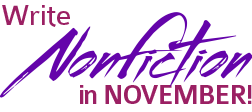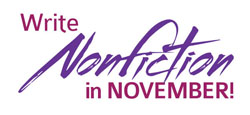 This post is part of the Write Nonfiction in November Challenge (WNFIN), also known as National Nonfiction Writing Month (NaNonFiWriMo), which is sponsored by the Nonfiction Writers’ University — join today for just $1! To find out more or participate in the WNFIN challenge, click here.
This post is part of the Write Nonfiction in November Challenge (WNFIN), also known as National Nonfiction Writing Month (NaNonFiWriMo), which is sponsored by the Nonfiction Writers’ University — join today for just $1! To find out more or participate in the WNFIN challenge, click here.Good habits make for productive writing. But never do you need good habits more than when you set out to write a nonfiction book in a month. In fact, whenever you set a tight deadline and want to start and finish a writing project on time, you need to evaluate and improve five specific habits.
Your current habits have helped you achieve your current level of success. If you want to reach a higher level of success, you need to change or improve your habits. Even if you are happy with your current level of success, consider what it would be like to have even greater success as a writer. What would that take? Better habits.
Level up your habits, level up your success. Better habits equate to a greater ability to meet your goals—including writing a nonfiction book in 30 days.
The following five must-have habits will help you complete the Write Nonfiction in November (WFIN) Challenge, aka National Nonfiction Writing Month (NaNonFiWriMo), or any project you want to finish fast.
5 Must-Have Habits for Writers
Habit #1: Consistently use your calendar.
It’s amazing how many people—and writers—do not use a calendar except to record and remember doctor’s appointments. You need to make the calendar, which means either a physical or virtual daily scheduling tool, your accountability partner.
 At the beginning of every week, get out your calendar and block time for writing. You could block out an hour or two Monday through Friday starting at 7 a.m. and three hours on Saturday afternoon beginning at 2 p.m., for instance. These blocks become appointments, just like going to the dentist, meeting with your personal trainer, or getting your hair cut. Imagine that changing these appointments costs you money…every time! (In other words, it should feel painfully difficult to miss a writing appointment with yourself.)
At the beginning of every week, get out your calendar and block time for writing. You could block out an hour or two Monday through Friday starting at 7 a.m. and three hours on Saturday afternoon beginning at 2 p.m., for instance. These blocks become appointments, just like going to the dentist, meeting with your personal trainer, or getting your hair cut. Imagine that changing these appointments costs you money…every time! (In other words, it should feel painfully difficult to miss a writing appointment with yourself.)
Every morning, review your calendar—your schedule for the day. Be sure you adjust as necessary to get in your writing time. If you prefer, review your calendar the night before.
To be sure you don’t “miss” some commitment because it wasn’t on your calendar and, therefore, also miss your writing appointment, put everything on your calendar. Yes…everything. That means your workouts, grocery shopping trips, lunch dates with friends, time when you check email or respond to blog comments, and even dinner, phone calls, and morning rituals.
Habit #2: Write daily.
Writing must become a habit. After all, writers write…not occasionally but daily. When you start writing on a regular basis, you train yourself to produce written work consistently. You create a writing habit.
Choose a day and time for your writing blocks. As much as possible, stick to this schedule (and put in on your calendar). Try writing for the same amount of time daily, too. But even if you can’t write for that amount of time, write…even a little.
For those who say they have no time to write, I recommend starting with short blocks of time—15 or 30 minutes per day. You can increase the amount of time as you get in the habit of writing. But write every day.
Habit #3: Develop a daily word-count goal.
If you want to write a book in a month, you need to have an idea of the number of words you must produce per day. Otherwise, you could end up short at the end of the month, which means your manuscript won’t be complete.
To develop a daily word count, determine the length of your WNFIN Challenge book or project. Then do a few writing tests; see how many words you produce in 30 or 60 minutes.
Now, divide the estimated words count of your finished project by the number of hours you plan to write each day during November. You then will know how many words you need to produce in an hour. For instance, if you want to complete a 50,000-word book in 30 hours (one hour per day for 30 days), you must be able to produce 1,666 words in 60 minutes. If you can’t do that, increase the amount of time you set aside on your calendar daily to write. Use your word-count tests to decide on the length of your writing blocks.
Keep track daily of whether you meet your world-count goals. If not, you need to adjust the amount of time you write each day or week.
Habit #4: Set priorities.
If you don’t get around to writing or life seems to always get in the way (come first) of writing, you haven’t prioritized writing. It’s time to make this activity your #1 priority—especially during the WNFIN Challenge.
If writing never becomes your priority, everything else always comes first. And your book won’t get written. That’s why writing and your writing project must feel so important that they take precedence or becomes a must-do item every day.
I get it… You have kids, and, of course, they often demand to come first. You have a job with deadlines and demands. But…if you use your calendar and schedule your writing blocks, you can, in most cases, make writing a priority—and treat it as such.
Writing first thing in the morning—before the kids wake up and before you even shower and dress for work—is one way to prioritize writing. You also can block time before bed, but it can be easy to claim you are too tired to write at that point in the day. If you can commit to writing no matter what before you go to bed, then late-day writing works.
Habit # 5: Get Organized.
To write a book in a month, you need all your research, files, pens, sticky notes, etc., at your fingertips. You don’t want to spend a ton of time regularly looking for what you need—even files you know you saved somewhere on your computer but now can’t locate. If you do, you won’t write; instead, you’ll search.
You can use an online filing system, like Dropbox or Evernote, or an old-fashioned filing cabinet. It matters little if your “tools” are in a drawer under or a box on top of your desk. Have everything you need not only handy but organized as well. That means you need to label folders and create a filing system that works for you—not for someone else.
 Ingrain these habits in your writing life, and you can call on them not only during a writing event like the WNFIN Challenge but at any time of the year. You’ll find they make you more productive and help you achieve your writing goals consistently.
Ingrain these habits in your writing life, and you can call on them not only during a writing event like the WNFIN Challenge but at any time of the year. You’ll find they make you more productive and help you achieve your writing goals consistently.
If you need help developing supportive writing habits, consider joining the next High-Performance Writer Group Coaching session. (Take advantage of the early early-bird special and save $100 if you register in November!)
What are the habits that help you write productively during a 30-day writing challenge?
Take the Challenge!
 To learn more about how to take the WNFIN Challenge and participate in NaNonFiWriMo, click here.
To learn more about how to take the WNFIN Challenge and participate in NaNonFiWriMo, click here.
Photo copyright: dragonimages / 123RF Stock Photo

Alena Sham says
Awesome post! I’m also curious how long it takes to write such a detailed post? I ghost write a few corporate blogs and it can take up to 4 hours to write one post! But I’m not an expert in the field so a lot of that is research. What your thoughts? Thanks!
Nina Amir says
Alena,
It doesn’t take me long to write a post like this because it’s my area of expertise. I can write the first draft in under an hour. And then I edit, put it through Grammarly (edit again there), and I’m done. So between an hour and a half and two hours max. I then create the image and tweak the page, etc. I figure each post takes me about two hours. If I had to do research, that could be a different story. I’d probably have to add in at least an hour for that. Hope that helps!